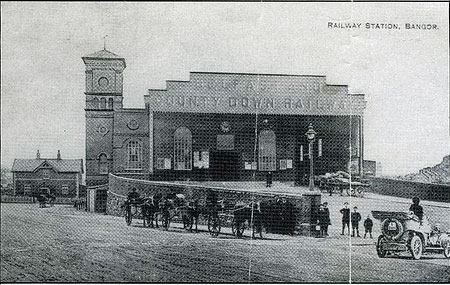 Daylight saving, that perennial hot potato, was introduced during the Great War, in an age when not everyone had a watch, and there were no ‘speaking clocks’ or radio pips to give you the correct time. The Summer Time Act, 1916 - i.e. moving clocks forward by one hour to take advantage of the longer daylight hours in the summer months seemed simple enough - however in Bangor, County Down, it proved slightly more complicated than in London.
Daylight saving, that perennial hot potato, was introduced during the Great War, in an age when not everyone had a watch, and there were no ‘speaking clocks’ or radio pips to give you the correct time. The Summer Time Act, 1916 - i.e. moving clocks forward by one hour to take advantage of the longer daylight hours in the summer months seemed simple enough - however in Bangor, County Down, it proved slightly more complicated than in London.
Timepieces in Ireland, which were normally set at Dublin Mean Time (by which the trains ran), had a disparity of twenty-five minutes with Greenwich Mean Time, but on 1st October 1916, when Summer Time ended for the year, it was decided that all clocks were to be brought into line with London. This meant that the Bangor Railway Station Clock was to be put back only thirty-five minutes instead of one hour.
Now you need to concentrate for the next bit. It was pointed out in the North Down Spectator & Ulster Standard that Belfast and Bangor were twenty-three minutes and thirty-nine seconds behind Greenwich Mean Time, not twenty-five minutes as in Dublin, and, surely, that meant that local clocks should be adjusted accordingly, by thirty-six minutes and twenty-one seconds. The Bangor Station Clock, which showed Belfast time on the outer dial and Dublin time (remember, the trains ran to this one) on the inner dial, therefore was brought into line with the Albert Memorial clock in Belfast, which was set at Greenwich Mean Time. The consequence was that latecomers at Bangor Station could no longer take advantage of the one minute, twenty-one seconds they had previously in hand when they looked at Belfast time on the outer dial on their way to the Station! At least they were spared the clocks with two minute-hands on a single dial, one for local time and one for London time, which graced some English Stations.
The Summer Time Act was not popular with Bangor’s seriously confused commuters, but objectors were put firmly in place by the writer of the ‘Notes and Comments’ column in the Spectator:
“Some stubborn people may persist in keeping their private clocks and watches at Dublin Mean Time but, with all public clocks and public arrangements operating under the New Act, the disadvantages to these pig-headed people will prove so great that they will be glad to regulate their habits to altered conditions.”
In 1918 there was consternation when it was suggested that clocks should be adjusted by two hours. Edith, Lady Londonderry, stoutly declared that the only possible objections could come from children and cattle: “Children have a constitutional objection to going to bed by daylight” she said, and continued, “I remember what a bother we had to get the cows up in the morning in time to be milked for the early trains…they were worse than the milkmaids. But after their first resentment against the change they soon adjusted themselves to the new conditions.”
Obviously she was unaware of the uproar over the Bangor Railway Station Clock!
